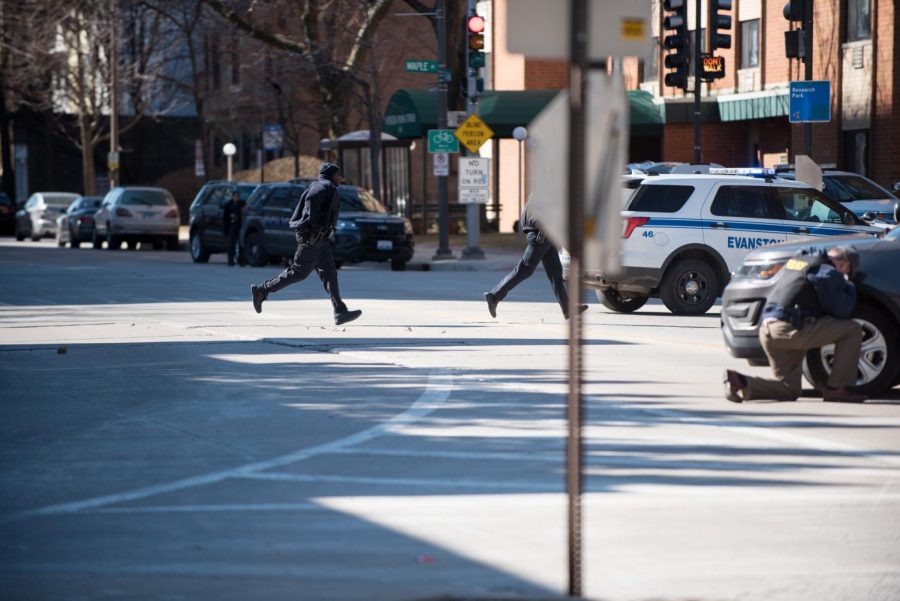Faculty, staff reflect on Wednesday lockdown, gun hoax
Colin Boyle/Daily Senior Staffer
Officers respond to the eventual gun threat hoax on Wednesday.
March 16, 2018
During a Wednesday lockdown that lasted over an hour, art librarian Cara List sat with about 50 students in Deering Library, doing her best to be responsible for student safety as the threat of a gunman on campus loomed.
“I can’t just think for myself,” List said. “I’m always thinking about the students who are around, and I think every one of us feels that way. In the library especially, we are in a service industry. We are hard-wired to help people, so we do our best.”
During the campus-wide lockdown, many faculty and staff were thrown into positions of crisis management as students were stuck in various buildings on campus, such as Norris University Center and the McCormick Foundation Center, based on a report of a person with a gun on campus. The lockdown began in response to a man who called the police claiming he had shot his girlfriend at a graduate student residence, a report that was later determined to be a hoax.
List said she felt “fairly calm” during the incident because her assistant attended a University Police emergency situations safety session earlier in the year, and they had informally discussed what to do if there was an active shooter threat on campus. Even though University Police told trainees they shouldn’t try to be heroes, List said, she knew she had to take responsibility for students.
Locked in the library, List said students and staff were quiet — texting others and checking the news. She said everyone intuitively acted as they should, by staying calm while in hiding.
Beinen and Weinberg junior Cassidy Cottle, a center desk supervisor in Norris, said she and other Norris employees moved with a “robotic response” to help move students to the basement and offices. Students and staff members were calm, Cottle said, but it was a “waiting game” as she was “freaking out.”
“We passed out candy,” Cottle said. “There was cake in the fridge, and so we tried to make as comfortable a situation for those people as possible, and you know, you go home afterwards and then you cry.”
Several Medill School of Journalism, Media, Integrated Marketing Communications professors in the McCormick Foundation Center were meeting with students immediately before the lockdown.
Medill lecturer Karen Springen said she locked herself and two Medill students in her office on the fourth floor after the first emergency alert. Springen said they were calm, but in hindsight, she said she may have stacked chairs behind the door and closed the blinds.
“The silver lining was that it’s a drill, right?” Springen said. “Now the University will look into what its procedures are and I hope and I think they will include faculty, students, staff, administrators, police. … Everybody has a different perspective.”
Springen said she didn’t open the door to her room until about two hours after the first 2:30 p.m. emergency notification because she and the students in the room kept getting notifications from the University at different times.
After the incident ended, Springen said she faced a dilemma as a teacher — to stick with the schedule she prepared, or give students more time to work on projects. Springen decided Thursday night to extend the deadline for a Friday assignment by 24 hours due to the “stressful” experience, she said in an email to The Daily.
Medill Prof. Larry Stuelpnagel, who also hid a student in his office, said when he was a child during the Cold War scares, he experienced “duck and cover” lockdowns in which students hid under their desks.
“Even at that young age, we all realized that it was stupid because hiding under your desk would not make you safe from a nuclear attack,” Stuelpnagel said. “‘Duck and cover’ has taken on a whole new meaning these days, in which case when you’re dealing with somebody with a gun, that might or might not protect you depending on the proximity of the gunman.”
Medill Prof. Mei-Ling Hopgood, who also hid in her McCormick Center Foundation office, said the incident provided an opportunity to reflect on credibility of sources, as well as University policies.
As a journalist who has covered crime and disaster, Hopgood said she understood there was a period of time when information was scarce. However, students were still looking to Facebook, Twitter and their friends for answers, Hopgood said.
“(Their friends) were saying things that were scaring them,” Hopgood said. “It was easy to feel that way, because you don’t know. … We have to be really vigilant about credible sourcing in that situation.”
Clare Roccaforte, director of marketing and communication for NU Libraries, told The Daily the library has not done lockdown drills before, only fire drills. List added that lockdown drills might only be familiar to U.S. students.
“We realize that a lot of students have done this kind of have done drills when they’re in high school, but perhaps some of our international students haven’t,” List said.
The University is following up about concerns with the emergency update system with an after-action analysis, as there appeared to be a “glitch” in how follow-up messages were sent out, University spokesman Al Cubbage told The Daily. In addition, NU will offer new training in basic disaster response skills through the Community Emergency Response Team program.
Stuelpnagel said he hopes this will be a foundational lesson for the University on how to handle lockdown situations.
“This is ridiculous that our society has come to this, that we have to do these sort of things,” Stuelpnagel said. “You can’t be too safe when you’re dealing with somebody who’s got a gun.”
Adrian Wan contributed reporting.
Email: [email protected]
Twitter: @alliejennaphoto
Email: [email protected]
Twitter: @alexisfwhite


